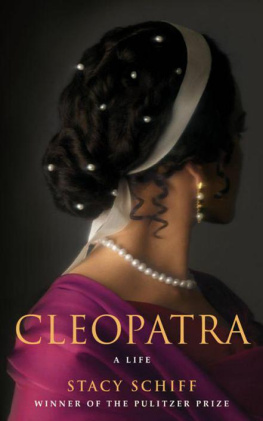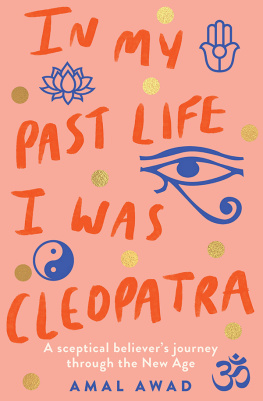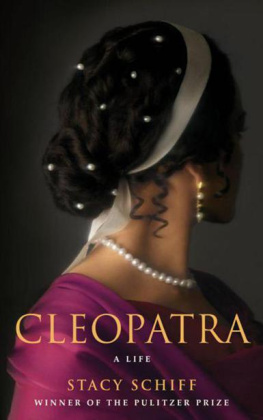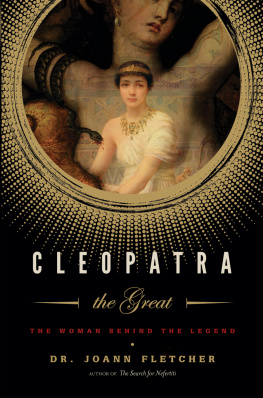Stacy Schiff - Cleopatra: A Life
Here you can read online Stacy Schiff - Cleopatra: A Life full text of the book (entire story) in english for free. Download pdf and epub, get meaning, cover and reviews about this ebook. year: 2010, publisher: Little Brown & Company, genre: Non-fiction. Description of the work, (preface) as well as reviews are available. Best literature library LitArk.com created for fans of good reading and offers a wide selection of genres:
Romance novel
Science fiction
Adventure
Detective
Science
History
Home and family
Prose
Art
Politics
Computer
Non-fiction
Religion
Business
Children
Humor
Choose a favorite category and find really read worthwhile books. Enjoy immersion in the world of imagination, feel the emotions of the characters or learn something new for yourself, make an fascinating discovery.
- Book:Cleopatra: A Life
- Author:
- Publisher:Little Brown & Company
- Genre:
- Year:2010
- Rating:3 / 5
- Favourites:Add to favourites
- Your mark:
- 60
- 1
- 2
- 3
- 4
- 5
Cleopatra: A Life: summary, description and annotation
We offer to read an annotation, description, summary or preface (depends on what the author of the book "Cleopatra: A Life" wrote himself). If you haven't found the necessary information about the book — write in the comments, we will try to find it.
Cleopatra: A Life — read online for free the complete book (whole text) full work
Below is the text of the book, divided by pages. System saving the place of the last page read, allows you to conveniently read the book "Cleopatra: A Life" online for free, without having to search again every time where you left off. Put a bookmark, and you can go to the page where you finished reading at any time.
Font size:
Interval:
Bookmark:
Finally, for Max, Millie, and Jo



trait is a judicious sense of what not to believe.
EURIPIDES

AMONG THE MOST famous women to have lived, Cleopatra VII ruled Egypt for twenty-two years. She lost a kingdom once, regained it, nearly lost it again, amassed an empire, lost it all. A goddess as a child, a queen at eighteen, a celebrity soon thereafter, she was an object of speculation and veneration, gossip and legend, even in her own time. At the height of her power she controlled virtually the entire eastern Mediterranean coast, the last great kingdom of any Egyptian ruler. For a fleeting moment she held the fate of the Western world in her hands. She had a child with a married man, three more with another. She died at thirty-nine, a generation before the birth of Christ. Catastrophe reliably cements a reputation, and Cleopatras end was sudden and sensational. She has lodged herself in our imaginations ever since. Many people have spoken for her, including the greatest playwrights and poets; we have been putting words in her mouth for two thousand years. In one of the busiest afterlives in history she has gone on to become an asteroid, a video game, a clich, a cigarette, a slot machine, a strip club, a synonym for Elizabeth Taylor. Shakespeare attested to Cleopatras infinite variety. He had no idea.
If the name is indelible, the image is blurry. Cleopatra may be one of the most recognizable figures in history but we have little idea of what than any other woman of her age, as an excitable rival king was reminded when he called, during her stay at his court, for her assassination. (In light of her stature, it could not be done.) Cleopatra descended from a long line of murderers and faithfully upheld the family tradition but was, for her time and place, remarkably well behaved. She nonetheless survives as a wanton temptress, not the last time a genuinely powerful woman has been transmuted into a shamelessly seductive one.
Like all lives that lend themselves to poetry, Cleopatras was one of dislocations and disappointments. She grew up amid unsurpassed luxury, to inherit a kingdom in decline. For ten generations her family had styled themselves pharaohs. The Ptolemies were in fact Macedonian Greek, which makes Cleopatra approximately as Egyptian as Elizabeth Taylor. At eighteen Cleopatra and her ten-year-old brother assumed control of a country with a weighty past and a wobbly future. Thirteen hundred years separate Cleopatra from Nefertiti. The pyramidsto which Cleopatra almost certainly introduced Julius Caesaralready sported graffiti. The Sphinx had undergone a major restoration, a thousand years earlier. And the glory of the once great Ptolemaic Empire had dimmed. Cleopatra came of age in a world shadowed by Rome, which in the course of her childhood extended its rule to Egypts borders. When Cleopatra was eleven, Caesar reminded his officers that if they did not make war, if they did not obtain riches and rule others, they were not Romans. An Eastern sovereign who waged an epic battle of his own against Rome articulated what would become Cleopatras predicament or perish in the attempt. The implications for the last remaining wealthy country in Romes sphere of influence were clear. Egypt had distinguished itself for its nimble negotiating; for the most part, it retained its autonomy. It had also already embroiled itself in Roman affairs.
For a staggering sum of money, Cleopatras father had secured the official designation friend and ally of the Roman people. His daughter would discover that it was not sufficient to be a friend to that people and their Senate; it was essential to befriend the most powerful Roman of the day. That made for a bewildering assignment in the late Republic, wracked by civil wars. They flared up regularly throughout Cleopatras lifetime, pitting a succession of Roman commanders against one another in what was essentially a hot-tempered contest of personal ambition, twice unexpectedly decided on Egyptian soil. Each convulsion left the Mediterranean world shuddering, scrambling to correct its loyalties and redirect its tributes. Cleopatras father had thrown in his lot with Pompey the Great, the brilliant Roman general on whom good fortune seemed eternally to shine. He became the family patron. He also entered into a civil war against Julius Caesar just as, across the Mediterranean, Cleopatra ascended to the throne. In the summer of 48 BC Caesar dealt Pompey a crushing defeat in central Greece; Pompey fled to Egypt, to be stabbed and decapitated on an Egyptian beach. Cleopatra was twenty-one. She had no choice but to ingratiate herself with the new master of the Roman world. She did so differently from most other client kings, whose names, not incidentally, are forgotten today. For the next years she struggled to turn the implacable Roman tide to her advantage, changing patrons again after Caesars murder, ultimately to wind up with his protg, Mark Antony. From a distance her reign amounts to a reprieve. Her story was essentially over before it began, although that is of course not the way she would have seen it. With her death Egypt became a Roman province. It would not recover its autonomy until the twentieth century.
herself, doing gladly whatever pleased him, not meddling with any of his affairs, and, in particular, by pretending neither to hear of nor to notice the favorites that were the objects of his passion. There is no reason to accept that formula at face value. On the other hand, Cleopatra was cut from very different cloth. In the course of a leisurely fishing trip, under a languid Alexandrian sun, she had no trouble suggesting that the most celebrated Roman general of the day tend to his responsibilities.
To a Roman, license and lawlessness were Greek preserves. Cleopatra was twice suspect, once for hailing from a culture known for its (She was rather an intensely focused woman of twenty-one.) The siren call of the East long predated Cleopatra, but no matter; she hailed from the intoxicating land of sex and excess. It is not difficult to understand why Caesar became history, Cleopatra a legend.
Our view is further obscured by the fact that the Romans who told Cleopatras story very nearly knew their ancient history too well. Repeatedly it seeps into their accounts. Like Mark Twain in the overwhelming, overstuffed Vatican, we sometimes prefer the copies to the original. So did the classical authors. They conflated accounts, refurbishing old tales. They saddled Cleopatra with the vices of other miscreants. History existed to be retold, with more panache but not necessarily greater accuracy. In the ancient texts the villains always wear a particularly vulgar purple, eat too much roasted peacock, douse themselves in rare unguents, melt down pearls. Whether you were a transgressive, power-hungry Egyptian queen or a ruthless pirate, you were known for the of your accessories. Iniquity and opulence went hand in hand; your world blazed purple and gold. Nor did it help that history bled into mythology, the human into the divine. Cleopatras was a world in which you could visit the relics of Orpheuss lyre, or view the egg from which Zeuss mother had hatched. (It was in Sparta.)
History is written not only by posterity, but for posterity as well. Our most comprehensive sources never met Cleopatra. Plutarch was born seventy-six years after she died. (He was working at the same time as Matthew, Mark, Luke, and John.) Appian wrote at a remove of more than a century; Dio of well over two. Cleopatras story differs from most womens stories in that the men who shaped itfor their own reasonsenlarged rather than erased her role. Her relationship with Mark Antony was the longest of her life, but her relationship with his rival, Augustus, was the most enduring. He would defeat Antony and Cleopatra. To Rome, to enhance the glory, he delivered up the tabloid version of an Egyptian queen, insatiable, treacherous, bloodthirsty, power-crazed. He magnified Cleopatra to hyperbolic proportions so as to do the same with his victoryand so as to smuggle his real enemy, his former brother-in-law, out of the picture. The end result is a nineteenth-century British life of Napoleon or a twentieth-century history of America, were it to have been written by Chairman Mao.
Next pageFont size:
Interval:
Bookmark:
Similar books «Cleopatra: A Life»
Look at similar books to Cleopatra: A Life. We have selected literature similar in name and meaning in the hope of providing readers with more options to find new, interesting, not yet read works.
Discussion, reviews of the book Cleopatra: A Life and just readers' own opinions. Leave your comments, write what you think about the work, its meaning or the main characters. Specify what exactly you liked and what you didn't like, and why you think so.







